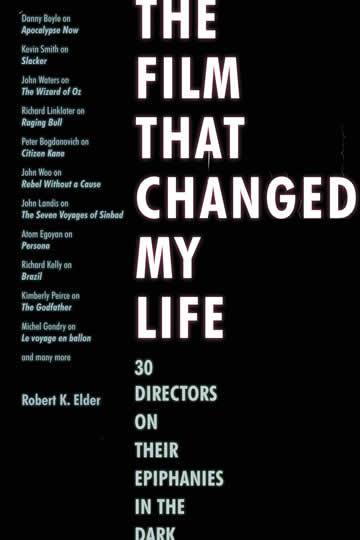 The Film That Changed My Life: 30 Directors on Their Epiphanies in the Dark is a book about epiphany moments. For filmmakers, it captures that first encounter with the movie that inspired them to direct movies. In The Film That Changed My Life, I talk with 30 directors about how this film influenced their own work and how it made them think differently about movies.
The Film That Changed My Life: 30 Directors on Their Epiphanies in the Dark is a book about epiphany moments. For filmmakers, it captures that first encounter with the movie that inspired them to direct movies. In The Film That Changed My Life, I talk with 30 directors about how this film influenced their own work and how it made them think differently about movies.
Film critic Leonard Maltin said, “You’ll have a hard time putting this book down.” Chicago Tribune film critic and former At the Movies co-host Michael Phillips has called the book, “A great and provocative read…it’s addictive.”
In The Film That Changed My Life, 30 celebrated directors talk about 30 films that shaped their careers and, in turn, cinema history. This book is written for a wide audience – promoting the discovery and love of film.
We had a conversation with Robert Elder, the author of The Film That Changed My Life, about his book and coverage of international filmmakers in it. Robert K. Elder is a journalist, author, film columnist and a regional editor of AOL’s Patch.com in Chicago.
Pulitzer-winner Studs Terkel calls Elder “a journalist in the noblest tradition” in his introduction to Elder’s 2010 book, Last Words of the Executed. Elder’s work has appeared in The New York Times, MSNBC.com, The Los Angeles Times, The Boston Globe, Salon.com, The Oregonian and many other publications. For more than a decade, he served as a staff writer at the Chicago Tribune.
Bijan Tehrani: What inspired you to write The Films That Changed My Life?
Robert Elder:: I have always been fascinated by epiphany moments and I had the idea for his book about ten years ago when I worked for Premiere magazine as an intern. Movies have always been my first love and directors have always been my favorite interview subject. And there is nothing that directors like to talk about more than their influences…
BT: How challenging was writing this book?
RE: The writing of it was fun, it was really a good time because I love film, research and commentary tracks but scheduling 30 directors I nearly impossible. And that is why it took five years to write.
BT: Was it easy to get the answers that you wanted from filmmakers?
RE: Most of them were done for about an hour an interview, some of the interviewees like Kevin Smith talked for about 3 hours. Directors love to talk.
BT: Do you have any favorite interview among the interviews in your book?
RE: That’s like asking me to choose a favorite child. But I loved the Richard Linklater interview about Raging Bull and also talking to John Woo about Rebel without a Cause, you see those two directors’ in completely different ways.
BT: Was there any American movie mentioned in interviews that is among your favorites?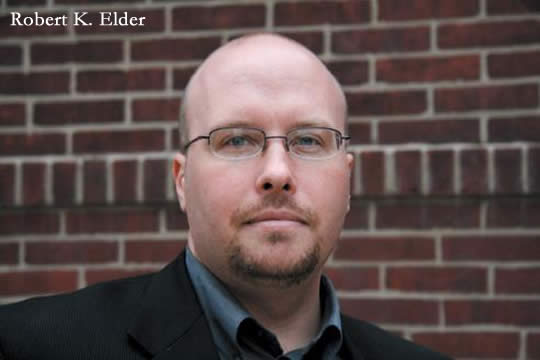
RE: Yeah, I actually love Apocalypse Now, which Danny Boyle talked about; I have really deep affection for Annie Hall which Rian Johnson talked about; Frank Oz and I talked about Orson Welles forever.
BT: Are their mention of any of your favorite international film in interviews?
RE: 8 ½ of course, Michael Gondry talking about this wonderful film Le Voyage en Ballon — which was a sequel of sorts to The Red Balloon – is great.
BT: Could you name a few international film directors with the films that influenced their filmmaking?
RE: Hollywood, especially for the time when most of these director’s were growing up is the dominant center of cinema. The thing that did surprise me was the selection of films from some of the director’s; for example George A. Romero, who we know for his zombie films, talked about The Tales of Hoffmann, which was an opera that changed his life. Kimberly Pierce who directed Boys Don’t Cry, talked about the The Godfather and how it deeply affected her and her attraction to the world of men. Sometimes they don’t even talk about their favorite films but rather the film that just turned on that spark inside them.
BT: What has been the critics’ reaction to the book?
RE: I have actually been very, very lucky, people have said wonderful things. Lawrence Grobel, one of my idols who wrote the bible on interviews, gave me a very positive review. Leonard Maltin said that you will have a “hard time putting this book down.” You can see the reviews at www.filmchangedmylife.com
BT: Is there a digital version of the book available?
RE: There has been a demand for one, therefore I’m sure that eventually we will go that way.
BT: Are you planning to write a similar book dealing with international filmmakers?
RE: I don’t make distinctions; I just love film and filmmakers, so in my previous books I have interview international filmmakers. I would love to talk with someone like Park Chan-wook, because I love Oldboy, I think that his films were very original. I don’t separate the filmmakers into national and international because I believe that the one thing that binds us together is our love of film.
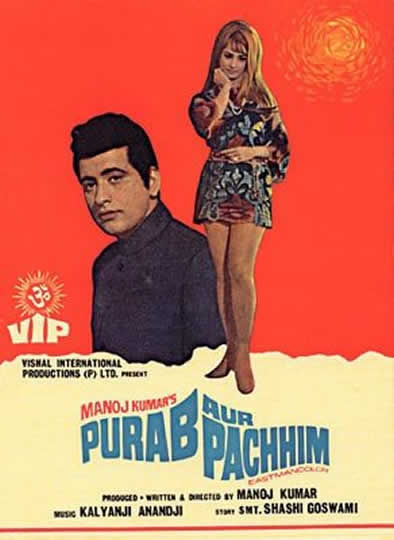 Excerpt from:
Excerpt from:
The Film That Changed My Life: 30 Directors on Their Epiphanies in the Dark
Gurinder Chadha on Purab aur Pachhim
Gurinder Chadha, selected filmography:
Bhaji on the Beach (1993)
What’s Cooking? (2000)
Bend It Like Beckham (2002)
Bride & Prejudice (2004)
Angus, Thongs and Perfect Snogging (2008)
It’s a Wonderful Afterlife (2010)
Influenced by:Purab aur Pachhim (a.k.a. Purab aur Paschim)1970, Directed by Manoj Kumar
Starring Ashok Kumar, Saira Banu, Manoj Kumar, Nirupa Roy,and more
*How would you describe Purab aur Pachhim to someone who has never seen it?
Chadha: No one would have heard of it, but it’s a fantastic Bollywood film and it means “East or West.” I often put that in my top ten movies. It was made in 1970 by a man called Manoj Kumar, and it’s one of the most wonderful Bollywood movies ever.
It’s about an Indian who comes to England to study. When he gets to England, he’s staying with an old friend of his dad’s; they were both freedom fighters against the British. He’s got a son and a daughter who have completely turned Westerners—they have very bad Western ways. Subtlety is not a big thing in this movie [laughs], like most Bollywood. The girl walks around with a glass of whiskey in one hand and cigarette in the other. And the guy is into flower power; he’s got long hair and sort of hippie clothes. So, it’s sort of on that level.
It’s a magical mystery tour of the East and West from a very kitsch, ’70s, resolutely patriotic Indian filmmaker. It’s a complete joyride in terms of music, entertainment, cinema, and cultural politics.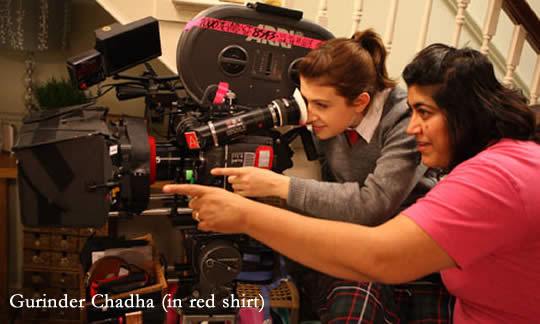
But it was the first film, the first sort of Manoj Kumar film that I saw. And it’s actually much cleverer than it sounds. Yes, on the face of it, it’s very brash and very silly. There are sequences on the River Thames when they’re all doing the Twist, and it’s cheesy and over the top. But underneath it, there’s a wonderful kind of yearning quality about what is culture and the perils of living in the West and the dangers of what could happen.
*Do you remember when you first saw it, who you were with?
Chadha: Yeah, I was a child, a small child, and I saw it in an Indian cinema in London. It would have been with my family. I was always watching Bollywood films, but this was the first one that showed England where we lived, as opposed to a set in India, so that’s what made it striking.
*Do you remember how your family talked about it when they saw it?
Chadha: I think everyone in England was very entertained by it because it was so far from the truth. It was such an exaggerated version of our lives in England. As a young girl with two long plaits, with a mother who refused to let us cut our hair or anything, this girl was supposed to be like us, with long blond hair and cigarettes and miniskirts. We were like, “God, that would be great! But we’re not allowed to be like that.” I think it was the incongruity of what he perceived people like us growing up in Britain to be like, and what we were actually like. That incongruity—that was bizarre.
*Was there a scene or sequence that you remember loving particularly?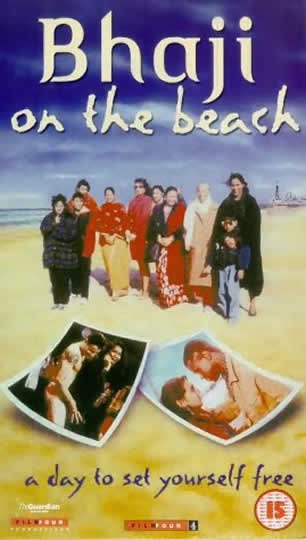 Chadha: As far as the characterization of the young woman: what she wore. And, actually, in my first film, Bhaji on the Beach, I referenced this film. In Bhaji on the Beach there’s a character called Asha who had a video store. She kept going off into these fantasies and imagining what was going on around her, but she would experience those fantasies through Bollywood movies.
Chadha: As far as the characterization of the young woman: what she wore. And, actually, in my first film, Bhaji on the Beach, I referenced this film. In Bhaji on the Beach there’s a character called Asha who had a video store. She kept going off into these fantasies and imagining what was going on around her, but she would experience those fantasies through Bollywood movies.
I would take elements of the story and make use of a Bollywood vignette. And one of them referenced Purab aur Pachhim. It’s when she realizes that one of the young girls is pregnant and she’s got a black boyfriend, and she’s like, “Oh my God, this is what England is doing to our kids.”
In my film, she walks into a temple in a miniskirt and a long blond wig, with a glass of whiskey in one hand and cigarette in the other. That was a complete reference to the film.
*Did you ever work with or run into anybody associated with the film?
Chadha: Well, as it happens, I was in India just recently for the release of Bend It Like Beckham, and I was on a TV program. They were asking me about films I had loved growing up, and I talked about this film.
Afterwards, I got a call saying the director, Mr. Manoj Kumar, wants to talk to you. The director of the film tracked me down and basically he was so thrilled that I talked about him in my interview, about influencing me, that he invited me over for dinner, for tea. And so I went over and saw him.
He’s an old man now, but it was a complete thrill for me. He’s also the star of the film, so he’s a very dashing man. And here he was this old man, in bed with dyed hair. He was great, completely focused and to the point, and still wanted to make very patriotic films. He was operating at a time when India was desperately trying to find an identity for itself after so many years under British rule and, prior to that, Muslim rule under the mogul.
So he used to make films that were all about rekindling and promoting a sense of Indianness, of Indian pride. And he loved the fact that he thought I was doing something similar, albeit in a British context, that I had been touched by him. It was a very moving few hours I had spent with him.
*What was the film’s reception like in Britain?
Chadha: Well, it was a huge hit in the Indian community. It’s a gem, but, of course, someone who knows nothing about Indian film wouldn’t know about it. That’s why it’s important for people like me to talk about it, because otherwise people would think the Indian cinema starts and stops with Satyajit Ray.
I was always taken to very populist films by my parents. And so, for me, it’s about promoting this sort of work that no one knows about, but definitely was an influence on me, as was Ken Loach and all his early films of the ’60s.
The actual film that I saw on a screen when I was young, and I thought, “Wow, I want to make movies like this!” was My Beautiful Laundrette by Stephen Frears, because that was a portrayal of my community in 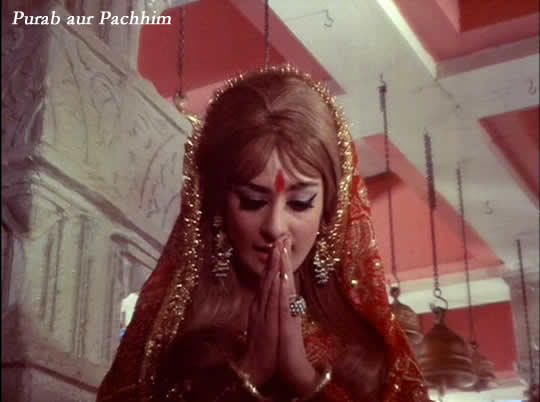 Britain in a very exciting way that I’ve never seen before. It tackled homosexuality and right-wing Indians, and it was just something different. Really political for that time—I just thought it was the most exciting movie on the screen, in terms of race.
Britain in a very exciting way that I’ve never seen before. It tackled homosexuality and right-wing Indians, and it was just something different. Really political for that time—I just thought it was the most exciting movie on the screen, in terms of race.
Where I grew up, we had three cinemas that showed Indian films. But then down the road, there was an English cinema where I saw The Wizard of Oz and The Sound of Music, all those kind of movies. And on television every Saturday and Sunday afternoon, I used to love watching all the old British films by Ken Loach and people like that, where you’d get workingclass girls getting pregnant and going for abortions, and all these kinds of really gritty social-realist movies. And, of course, the old evening comedies. I loved the old Alastair Sim, Margaret Rutherford comedies, so I had a very mixed diet of films when I was growing up.
*Does your perception of that film change with subsequent viewings?
Chadha: It gets better and better. Because as a filmmaker, I came to appreciate a bit more of how clever he was in terms of his message. If you look at it, it could be a very propagandist sort of message. It could have been very two dimensional; he could have shown the West is bad and the East is good, but he did a very good job of making it human, making the characters human, making it work in a very human way.
My films are from a much more celebratory view to show that the nightmare Manoj Kumar saw was going to happen—actually didn’t happen. It’s like the opposite, you know. It’s a film that has really informed me, and it’s an absolute gem. If I had the power, I would take it and release it myself.

